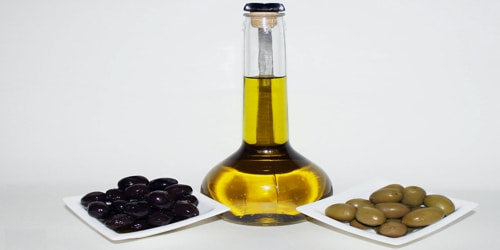Olive Oil
Definition: Olive oil is a liquid fat obtained from the fruit of the Olea europaea (olive tree), a traditional tree crop of the Mediterranean region. Whole olives are pressed to produce this distinctive oil. It is commonly used in cooking, whether for frying or as a salad dressing. It is also used in cosmetics, pharmaceuticals, and soaps, and as a fuel for traditional oil lamps, and has additional uses in some religions. The olive is one of three core food plants in Mediterranean cuisine; the other two are wheat and grapes.
Olive oil originally came from the Mediterranean, but today it is used worldwide.
Most of the world supply of olive oil is produced in the countries of the Mediterranean Basin, but some are produced in California, South America, and Australia. Leading producers include Spain, Italy, Greece, and Tunisia. While some of the oil produced in the Mediterranean Basin is consumed there, a significant portion of it is exported.
The composition of olive oil varies with the cultivar, altitude, time of harvest and extraction process. It consists mainly of oleic acid (up to 83%), with smaller amounts of other fatty acids including linoleic acid (up to 21%) and palmitic acid (up to 20%). Extra virgin olive oil is required to have no more than 0.8% free acidity and is considered to have favorable flavor characteristics.

Types of Olive Oil:
- Refined Olive Oils – Only about 30 percent of all olive oil production ends at extracting the oil from the olives. Refining involved using solvents and high heat to neutralize the tastes of the oil. This allows producers to use olives that are not in the best condition, and blend from oils from a wide variety of sources (even countries) because the bad tastes resulting from oxidized olives and the mass production process are chemically removed.
- Unrefined Olive Oils – Unrefined olive oils do not undergo chemical refining. In unrefined olive oils, such as “extra virgin” and “virgin” olive oils, the process goes no further than extraction and bottling. Producers of unrefined olive oils need to use fruit that is in good condition and carefully manage various factors because the oil will not be treated to chemically hide bad tastes that would result from oxidized olives or some other contamination.
- Extra Virgin Olive Oil – An unrefined olive oil that exhibits nice fruity flavors, has no taste “defects” and meets certain benchmarks in its chemical composition can be called “extra virgin.” In extra virgin olive oils, the tastes of the fruit are intact, and its quality reflects the great care along the entire production process. Extra virgin olive oils have higher amounts of nutrients and therefore provide greater health benefits.
Nutrition: According to the United States Department of Agriculture (USDA), 100 milliliter (ml), or 3.5 ounces, of one type of olive oil, contains:
- Energy: 800 kcal
- Fat: 93.3 g, or which 13.33 g is saturated and 66.6 g is monounsaturated
It contains no carbohydrate or protein. The nutritional benefits of olives and olive oil are directly related to the types of fatty acid and the significant amounts of anti-oxidants derived from Vitamins E and K.
Production of Olive Oil: In 2016/17 period, world production of virgin olive oil was 2.586,5 thousand tonnes, an 18,6% decrease under 2015/16 global production. Spain produced 1.290,6 thousand tonnes or 50% of world production. The next six largest producers – Turkey, Greece, Italy, Morocco, Syria and Tunisia – collectively produced 70 percent of Spain’s annual total.
Some 75% of Spain’s production derives from the region of Andalucía, particularly within Jaén province which produces 70% of olive oil in Spain. The world’s largest olive oil mill (almazara, in Spanish), capable of processing 2,500 tonnes of olives per day, is in the town of Villacarrillo, Jaén.
Turkey is the largest producer outside the EU (table), with 208,000 tons produced in 2016 to 2017, cultivating from 174.594 thousand trees. Greece is the third largest producer of olive oil. As of 2009, there were 531,000 farms cultivating 730,000 hectares (1,800,000 acres) from 132 million trees producing 310–350,000 tons of olive oil. Italy produced 182,300 tonnes in 2016/17 or 7,6% of the world’s production.

Uses and Health Benefits of Olive Oil: Olive oil is a monounsaturated fat and the cornerstone of the famous Mediterranean diet. Most people choose olive oil because of its many proven benefits to human health. Extra virgin olive oils offer even more: a world of fruity-bitter tastes that chefs are capturing to elevates dishes to a level they never thought possible.
Over the last 50 years, many studies have looked at the health benefits of olive oil.
Olive oil is the main source of dietary fat in the Mediterranean diet. There appears to be a lower death rate from cardiovascular diseases in the Mediterranean area, compared with other parts of the world. People who regularly consume olive oil are less likely to develop cardiovascular diseases, including hypertension (high blood pressure), stroke, and hyperlipidemia (high blood cholesterol and triglyceride levels).
Olive oil intake also appears to help reduce inflammation, endothelial dysfunction (problems with the inner linings of blood vessels), thrombosis, and carbohydrate metabolism.
People who regularly eat foods fried in olive oil or sunflower oil do not have a higher risk of heart disease or premature death. Olive oil may prevent stroke in older people.
Heart disease, diabetes, Alzheimer’s and cancers are among the long list ailments that can be avoided and conditions that can be improved by a diet that includes olive oil. Replace other fats like butter with at least two tablespoons of extra virgin olive oil every day, eat lots of veggies and go for a walk.
Information Source:
















